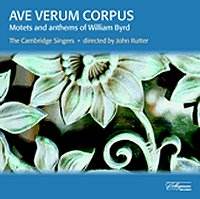This is a straight reissue of a CD which originally
appeared in 1990. Unlike several other labels Collegium have not chosen
to downgrade the presentation upon reissuing the disc at medium price.
The reissue retains the original very good notes by John Rutter and
the full texts and translations. The only changes from the packaging
of the original disc involve new cover artwork and the inclusion of
a photograph showing Rutter and his singers recording in the Lady Chapel
of Ely Cathedral (even though this recording was not made there!). From
an A/B comparison of the original CD, which I have owned since its first
release I could not detect any variances in the recorded sound. So,
three cheers for Collegium in respect of presentation!
And three cheers, too, for the quality of the performances.
In the thirteen years which have elapsed since this recording was made
the performance of Byrd has moved on somewhat in that several specialist
ensembles such as The Cardinall’s Musick have issued excellent CD recitals
of music by Byrd and his contemporaries. However, this disc demonstrates
conclusively that more generalist choirs can still provide excellent
accounts of this sort of music provided that those choirs consist of
first class musicians and that they are directed by equally first class
conductors.
John Rutter contributes a detailed note in which he
discusses some of the performance considerations behind the performance
of this programme. I can imagine that some may take issue with certain
of his ideas but to me they seem perfectly sensible and logical. In
particular he has eschewed ‘authentic’ pronunciation, preferring that
his choir sing Italianate Latin and modern English. This, and other
decisions which he has taken seem logical if for no other reason than
that non-specialist listener coming to this CD will encounter performances
which sound similar to those which he or she will have heard in cathedrals
and churches. In other words, Rutter’s ideas produce performances which
will relate closely to the listening experiences of most people. He
has clearly thought about the issues very carefully and, dare I say,
from a composer’s perspective as well as that of a performer.
Having established his performance principles it is
clear that he has gone on to train his 28-strong choir with scrupulous
care. He writes "the guiding principle adopted has been to aim
for textural clarity in complex passages while allowing a natural increase
of vocal sonority in homophonic passages." To my ears, he and his
singers have successfully achieved this aim.
The pieces gathered here are mainly taken from the
Cantiones Sacrae collections of 1575 and 1591 and from the two
volumes of Gradualia which Byrd published in 1605 and 1607. The
exceptions are the three English items. Concise, informative notes about
each individual piece assist the listener’s appreciation greatly and
place each piece in its proper place in Byrd’s output.
As I indicated earlier the performances are from the
top drawer. The more vigorous items such as Sing Joyfully (track
1) and Attollite Portas (track 8) are well done
though some may feel that Praise our Lord, all ye Gentiles (track
3) is a little too smoothly sung. I would have thought that Solvente
iubente Deo (track 14) could usefully have had a bit more bite.
However, the solemn chordal harmonies of Emendemus
in melius (track 4) are well realised and Siderum Rector (track
5) is supple and flowing. Two of the best-known items, Ave verum
Corpus (track 11) and the sublime O magnum mysterium (track
15) receive splendid performances while O quam suavis (track
17) is quite lovely. In fact, I feel that Rutter and his singers are
perhaps best suited to the more introverted or reflective side of Byrd’s
output. Perhaps it is no accident that such pieces predominate in this
recital, culminating in Justorum animae (track 18) which brings
the programme to an exquisite and eloquent close.
John Rutter himself cautions, sensibly I think, against
listening to such a programme as this straight through, an experience
which he likens to attending a complete performance of Bach’s ‘48’ ("worthwhile,
but utterly different to the composer’s intentions", as he puts
it). Probably such a consideration is one reason why the programme has
been split into four sections of varying lengths. I think Rutter is
right: this is a programme to dip into, all the better to marvel at
the genius of William Byrd.
An excellent disc, then, containing a good selection
of some of the finest a capella music written for the English
church. The performances are consistently of the highest order and the
recorded sound is good, though personally I would have welcomed just
that little added ambience and resonance which might have been obtained
in Rutter’s favourite recording location, the Lady Chapel at Ely Cathedral.
Very well written and informative notes complete one’s pleasure in a
fine release. Strongly recommended.
John Quinn

